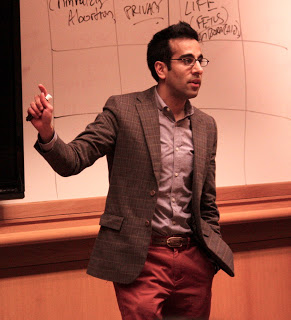- Public Policy
- Leadership
- Funding
- News & Events
- About the Center
Back to Top Nav
Back to Top Nav
Back to Top Nav
Back to Top Nav
 Sonu Bedi, an assistant professor in the Government department, urged the Rockefeller Leadership Fellows to be critical about the ‘language of rights’ when framing constitutional debates. This is because the language of rights is the language of the law. However, when used in a discussion, the language of rights can make discourse difficult. Ultimately, it may lead to a breakdown in conversation and result in one’s inability to convince others to think differently.
Sonu Bedi, an assistant professor in the Government department, urged the Rockefeller Leadership Fellows to be critical about the ‘language of rights’ when framing constitutional debates. This is because the language of rights is the language of the law. However, when used in a discussion, the language of rights can make discourse difficult. Ultimately, it may lead to a breakdown in conversation and result in one’s inability to convince others to think differently.
Professor Bedi then encouraged the Fellows to participate in an activity. He broke the group down into three sub-groups to discuss abortion, same-sex marriage, and affirmative action. Each group was assigned one of the three topics for discussion. The discussion revolved around four main questions. What is the law being discussed? What is the legal challenge to the law? What is the retort? How would we reframe the debate without the use of the language of rights? Professor Bedi went through these questions for each of the three topics in order to show the Fellows that the debates can indeed be reframed in a way that does not use the language of rights.
According to Professor Bedi, the language of rights and language of identity are hijacking debates. But in order to have a fruitful conversation one must provide reciprocal reasons for supporting a particular side of a debate. As a leader, you should encourage the participants of a group discussion to provide reciprocal reasons rather than engage in the language of rights. In short, leaders should undertake deliberate discourse because the language of rights is the language of the courts, not of leaders.
-Written by Maha Malik '13